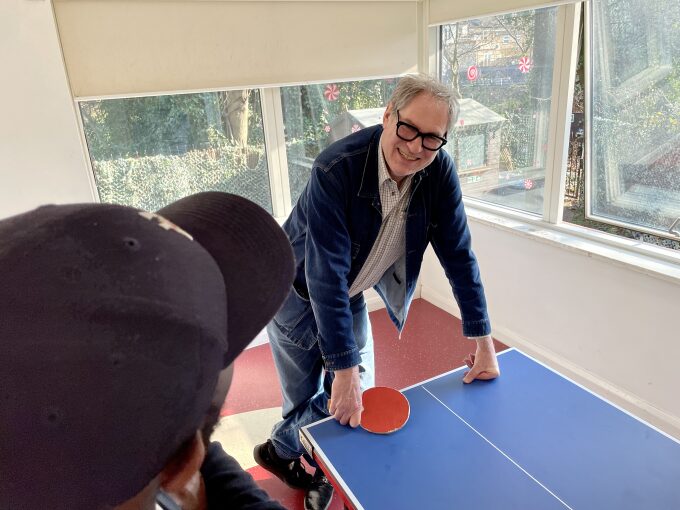
Luton Sinfield, Service Manager at the London Youth Hub, explains why homelessness should be something people pass through before getting on with the rest of their lives.
The first time I stepped foot in a night shelter back in the 1990s, I was immediately transported back to my childhood and my grandmother’s cheap boarding house outside Luton Railway Station. The evocative atmosphere of the shelter reminded me of the working men sleeping four to a room in my grandmother’s B&B all those years ago. It just felt familiar. I realised straight away ‘I know this world, and I know how to do this’.
Today, I manage the London Youth Hub in Islington where we offer short term safe and secure accommodation for young people at risk of street homelessness. It’s a very different experience. The 18-to-25-year-olds who stay with us have their own en-suite room, access to a mental health assessment and psychotherapist, education, training and employment opportunities, and sometimes we organise a day out to do something fun too – but most importantly we are there to help them move forward with their lives.
Watch while Luton takes you on a tour around The Hub.
The most exciting thing about managing the Hub is that we know it’s working because those passing through are not resurfacing in the city’s rough sleeping data. That’s a fantastic feeling – to know you are doing something right. That you’re not just offering a sticking plaster, another service to bounce between, but a real chance of a future. I like to think we’re a springboard into the rest of their lives.
One of the biggest challenges is that we take in up to 26 young people at a time. That’s 26 young people from vastly different backgrounds with different problems having to share a communal space and get on. Most of them are estranged from their parents for one reason or another. They’ve fallen out, there’s no space in the house, they’re neurodiverse or struggle with mental health issues, or they’ve come out as LGBTQ+ and their parents don’t accept them.
We also see a high number of non-UK residents who’ve recently been granted refugee status but evicted from their Home Office accommodation. They might need extra support with skills to help them live in the UK, or deal with the trauma they’ve endured to get here.
All these different people living together is not always smooth sailing, but sometimes the shared experience of being without a home can also bring them together. I love it when I see people who wouldn’t normally meet or have much in common, interact and get on. When someone’s saying they’re not going to join the evening Iftar meal during Ramadan because ‘it isn’t for me’, and then you see them sitting down, sharing food, and having a great time. That’s really nice.
Of course, the really rewarding thing is when people come back to us and tell us about the difference we’ve made and how they’re getting on now.
Johnny, who was a bit of a lively character, recently came back for a visit to tell us all about his new office job. It was great to see him so animated and proud of himself, and quite incredible to think about the background he has come from and where he is now. And then there’s Casey, who’s now a client ambassador making speeches about homelessness in the House of Lords. That’s when I am like ‘Wow, this is brilliant’. That’s when you see your success.
At times we do feel a bit like quasi-parents. The young people who stay with us need to feel listened to and heard. They need us to help them find solutions to their problems and treat them with respect, but we also need to be clear about our expectations of them and about their responsibilities, which includes respecting and tolerating others and engaging with the support being offered.
When I think about my grandmother and her old boarding house and the way she was, I can see there are similarities between our roles. She was this big maternal figure for those who lodged with her, but she still expected to be paid at the end of each week, no excuses. And in the same way, we’re here to support young people find a way out of homelessness, to walk alongside them and open doors, but we also expect them to work with us to do so, that’s the deal, no excuses.
I’ve always believed that homelessness should be something people pass through before getting on with the rest of their lives. It’s vital that young people are given the tools and opportunity to become active and positive members of their communities, and I am proud to say that at the London Youth Hub that really does feel like a possibility for those we support.
Take a look inside our London Hub
Thanks to the Players of the People’s Postcode Lottery, we are supporting thousands of young people at risk of homelessness to build brighter futures.